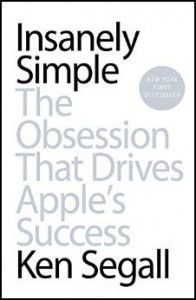Insanely Simple
I was quite surprised at how many ideas in Insanely Simple apply to the church. Who would have guessed that the church could learn a lot f rom Apple and Steve Jobs? Ken Segall does a great job of looking at the power of Apple’s commitment to Simplicity and the very real challenges and benefits of trying to live out that commitment.
rom Apple and Steve Jobs? Ken Segall does a great job of looking at the power of Apple’s commitment to Simplicity and the very real challenges and benefits of trying to live out that commitment.
Almost every chapter had solid take-aways for anyone leading a church or ministry. I’ll focus on a couple that really stood out to me.
I loved this quote regarding why Apple doesn’t multiply products like so many other companies:
“They seem to forget that trying to please everyone is a good way to please no one. Choosing the path of Simplicity, Apple elects to do just a few things but do them incredibly well.”
How different from the way so many of our churches operate. We often add program after program after program until we have more things going than we can keep track of, much less actually staff effectively. Our motives are usually good—we see real needs and want to meet them. But the reality is that no church can do everything. It’s better to do a few things well than a lot of things in a poor or mediocre way.
Our inability to say no to new programs or ideas is one reason so many pastors and leaders suffer burnout and why so many volunteers follow our lead. Most volunteers in church can give one time slot per week to the church—one evening, one weekend afternoon, etc. When we let programs proliferate, we often end up putting pressure on people to do more (because we have to keep the programs going). Our most committed people will often step up, but in the long run, they too will burn out, get resentful, or just disappear, because they can’t maintain that pace. In the worst cases, it becomes almost abusive, and people feel used and uncared for. Ironically, it can be very unloving to say yes to every ministry opportunity, because of what it costs our volunteers.
I also noted his comments on how Apple communicates. He used their marketing as an example, but it applies to their internal communication as well. For me, the application to our preaching and teaching in the church was obvious. Segall said:
“Apple didn’t describe the original iPod as a 6.5-ounce music player with a five-gigabyte drive. It simply said, ‘1,000 songs in your pocket.’ This is the way human beings communicate, so this is the way Apple communicates.”
While that sounds so obvious, I think it’s actually pretty hard. It takes work and a real commitment. It reminds me of some Olympic figure skaters or gymnasts—they often make what they are doing look effortless. The truth is that it takes an incredible amount of work to make things look so easy!
The same is true for our teaching. It’s easy to fall into using jargon—language that most people never use outside of Sunday mornings. It takes work to communicate biblical truths in ways people can understand. It’s easy to speak in ways that communicate only with people’s minds and never touch their hearts; it takes work to go beyond that and find the right story, the right illustration, or the right words to go deeper.
Besides helping people understand what we are saying on a deeper level, we are also equipping them to talk to others. If we use language on Sundays that they don’t use on Mondays, they either won’t tell others what they are learning or they won’t know how to communicate it effectively. But if we are speaking their language, they will be able to talk to others. It will be much more natural and more common.
I think our churches have a bias toward being more complex than is helpful or needed. Simplifying what we are doing has multiple benefits beyond the few I mentioned. Who would have guessed that the church can learn from Apple? I certainly have!
What has been your experience in this area of complexity and simplicity? Have you tried to simplify what you’re doing? How did it go? I would love to hear your thoughts.



No Comments